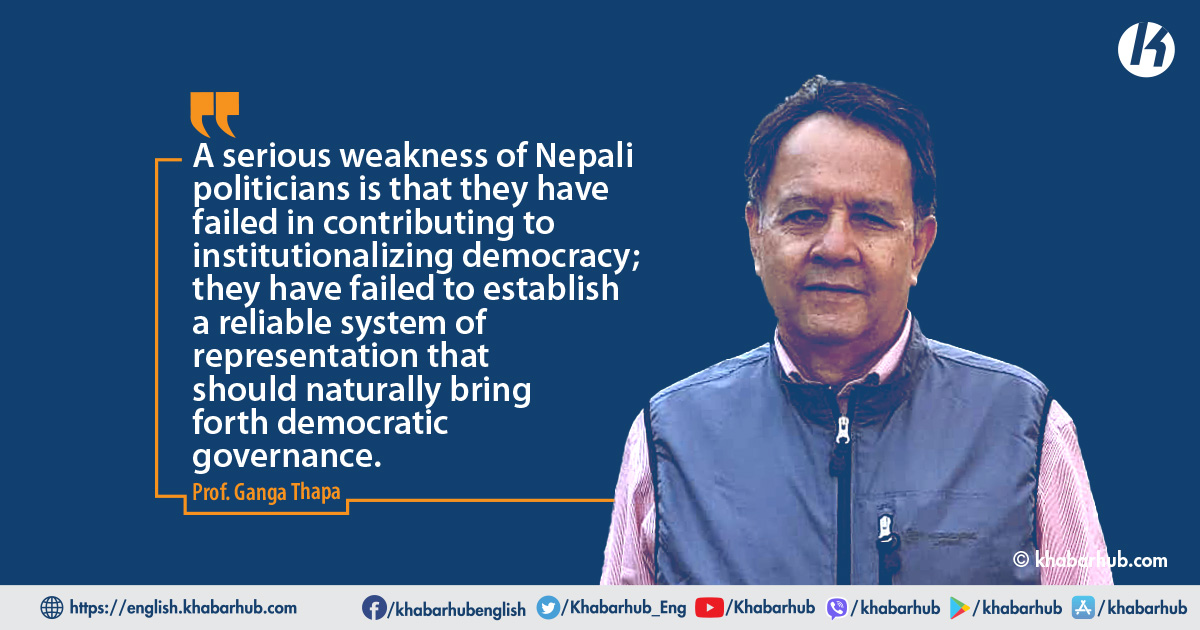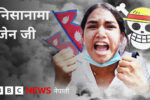Ancient democracy had developed around the fifth century BC in the Greek city-states. Although we do not know a lot about it, it is said to have the rule by the few and participation by the many since all adult male citizens were required to take part in the government, no matter what their local variation and vocation.
Since modern democracy ensures equal citizenship in a political society where the people’s representatives are chosen through competitive elections under universal suffrage, the people tend to believe that they, in turn, govern the state.
However, sustaining it constantly involves two challenges: the risk of the emergence of a strong executive power and citizens’ distrust.
Over the past three decades, Nepal has undergone dramatic political upheavals.
Indeed, the prime objective of Nepali democracy, ever since the elimination of absolute monarchy in 1990, was to reformulate a political system for the people in which the entire gamut of governmental activity could be engaged to democratically institutionalize the resilient public space where citizens could have critical discourses and differing views about marginalized sectors could also be articulated, contested, reviewed, and revised in an unobstructed manner.
Our problem in Nepal is that at times we tend to achieve the unattainable since powerful private interests are often able to successfully influence everything through the self-perpetuating cycles of elections that are marked by the widespread use of money, muscle, and malpractices involving even guns and goons.
Now the time has come to ask ourselves whether we indeed believe that we live under democracy, whether the people and the government institutions adhere to democratic norms, and whether the country may proudly be called having democracy.
More importantly, the present-day governance – the actual exercise of the polity that gives special identity to the political system and democratically creates a resilient public space through which the regime allows the citizens to enjoy unhindered liberty and equality to fulfill their expectations to subsequently develop the deliberative capacity of the public space and bring about adequate reforms – is still a glass-half-full situation due to the adversarial patronage, populist rhetoric, and money politics that create the requisite for likely detriment in developing transformative discourses in the public space which is even more impenetrable for any new ideas to get formulated in a meaningful conversation.
A serious weakness of Nepali politicians is that they have failed in contributing to institutionalizing democracy; they have failed to establish a reliable system of representation that should naturally bring forth democratic governance.
The crucial thing to recognize about the Nepali model of political development is the sheer lack of substantial leadership which is necessary to protect, promote and advance the national interests. Kenneth Boulding has aptly defined political power as the ability to change the (course of) future.
But in Nepal, one can see deception, cynicism, and betrayal all around. Invariably, the leaders are discovered as accomplished liars in public life; they act like bullies and influence everything in the self-perpetuating cycle; at the same time, they act like puppeteers or errand boys of foreign powers that have unduly been playing a larger than necessary role here.
The political leadership is not only immune to foreign influence which has an open face here but also those in power are continuously involved in institutional looting; that is why there is rampant corruption.
These dinosaur politicians neither follow the rule of law nor respect plural views and opinions that are required to formulate a progressive, practical, and positive vision to achieve sustainable peace, which typically demands genuine democratization, not just the majority rule. This has to be understood well and kept constantly in mind.
I am not drawing a negative conclusion. But, despite the greater openness since 1990, many crucial things are still at stake. We want our institutions to reflect the aspirations of the communities that are represented.
There’s a need to address the most pressing issues such as health, education, employment, and most of all, everyday active engagement with the common and the most vulnerable people rather than making a blaring noise in support of MCC, SPP, or BRI.
There’s still the prevailing view that the politicization of the country’s highest court is based on narrow interests rather than shared values and massive electoral fraud (vote buying), especially when puppeteers are desperately trying to seize politics and when there exists a cowardly civil society, intelligentsia, and media, the political elites get their political wishes fulfilled without a trace of accountability while the democratic institutions keep crumbling in the political sphere.
If there is a silver lining for Nepal’s beleaguered democracy, it is that human freedom is increasingly spreading, and citizens oppose personalism, which is associated with a variety of outcomes such as higher levels of populism, political polarization, economic anxiety, cultural unease, political frustration, and more importantly, citizens are increasingly open to alternative systems of governance.
A typically chaotic situation arises again and again in Nepal because our political leaders, intoxicated with the newly acquired power, set unrealistic goals but get busy in their career development and personal advancement facilitated by integrity dearth and tempted by fraud and corruption windfalls and even other incidents of unethical behavior; nonetheless, they want to manage the country with an iron fist or bulldozer politics insulting otherwise competent civil service and civil society.
A serious weakness of Nepali politicians is that they have failed in contributing to institutionalizing democracy; they have failed to establish a reliable system of representation that should naturally bring forth democratic governance.
For the masses of Nepali people, the time for choosing their representatives is getting near when they should opt for those who are dedicated to public service, committed to democracy, and loyal to the constitution.
Similarly, those engaged in watchdog journalism and those active in numerous civil society sectors representing a wide variety of interests concerned with the everyday practice of politics must also target some admirable outcome in the forthcoming general elections by endeavoring to eradicate the clutter and dump out the elderly demagogue ex-PMs, including Pushpa Kamal Dahal, Babu Ram Bhattarai, Khadga Prasad Oli, Madhav Kumar Nepal, and Sher Bahadur Deuba, the quintet that constitutes a latent threat to Nepali democracy and national sovereignty.
Finally, if there is a silver lining for Nepal’s beleaguered democracy, it is that human freedom is increasingly spreading, and citizens oppose personalism, which is associated with a variety of outcomes such as higher levels of populism, political polarization, economic anxiety, cultural unease, political frustration, and more importantly, citizens are increasingly open to alternative systems of governance.









Comment